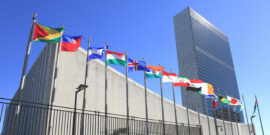"One nation, under woke, with retributions and grievances for all" is a future we should steadfastly resist.
Why We Can't All Just Get Along
Adam MacLeod is distressed at the incivility of American public discourse. He’s not alone in this. Nor is he alone in his conviction that, if we all would come together in a spirit of comity, accepting one another’s humanity and commitment to our own vision of the common good, we could reason together to solve shared, practical problems in a manner reinforcing human dignity within ordered liberty. In most ways, The Age of Selfies: Reasoning About Rights When the Stakes Are Personal offers a familiar, though especially cordial and lucid, formulation of the call to civility common among those who shrink from the unpleasantness of America’s conflictual politics. What makes this book different, and highly valuable, is MacLeod’s recognition that there is something going on besides misunderstanding—that some people seem not to want to be reasonable. He has no real answer for the impasse this produces for the intellectual mode in which he engages. But his openness to questions of character and imagination make one hope for a more interesting and fruitful conversation among defenders of ordered liberty than has been the case for many decades.
MacLeod self-consciously follows the method laid out by legal academic John Finnis, who has sought to adapt natural law thinking to the positivism of H.L.A. Hart. Finnis cuts off his “new natural law” from its metaphysical moorings and reduces it to rationalistic formulae. New natural law assumes we all seek certain “basic goods” and can find concrete answers to difficult moral questions by taking one or more basic goods as the goal, then deducing and avoiding actions that would prevent us from achieving that goal.
Such casuistry has uses but is hardly a workable mode of public discourse when so many see reason itself as a power construct and law as a form of race/sex/class or other-based power. MacLeod elides this problem by focusing on issues of perspective and perception. To promote reconciliation, he provides life-details and reassuring adjectives to brief portraits of a hypothetical recycler, law-and-order supporter, identity politics enthusiast, and highly religious person to show their common humanity and good will. “Each wants to bring about some aspect of the common good for everyone.” Our differences lay in our conceptions of that common good, rooted in our focus on different specific goods (e.g. in abortion the need to deal justly with the autonomy of the mother or to serve the good of life). We fall into ad hominem attacks despite our shared commitment to moral truth because we misunderstand “our different situations, goals, and judgments.”
According to MacLeod, the solution to our predicament is a matter of reasoning properly. We should simply focus on The Practical Question—formulating concrete solutions to problems defined narrowly in terms of basic goods. For example, instead of debating the justice of open or closed borders, MacLeod argues, we must pool our knowledge and reason together over who our nation should allow to immigrate, given the requirements of our common good. There is a problem, here. The discussion MacLeod seeks frequently seems impossible because it requires that both parties accept the moral status of the nation—of separate peoples with separate and valid interests. If one begins from the presumption that all persons everywhere have the same right to equal shares of wellbeing, then the only Practical Question is how to distribute goods. There is no common practical question because the parties’ views of the world are fundamentally different.
Here MacLeod recurs to issues of perspective and judgment. We have entered an “age of selfies,” he asserts, in which individualism has metastasized into a subjectivism so thorough that “young people have made their moral reasoning thoroughly personal.” The problem, for MacLeod, is a lack of basic rationality. If all our truths were valid, they would constantly conflict with one another, creating indecipherable chaos. As MacLeod notes, the inconsistencies of selfie culture are rooted in common refusal to make and stand behind judgments upholding dignity and truth.
But this shared character flaw stems from more than any mistaken assumption or deduction. Traditional natural law emphasizes that reasoning is difficult, requiring self-discipline and habituation as well as a personal orientation in keeping with what Rufinus the Canonist called natural law’s “pull” within us toward the good. It is tempting to reduce this problem to one of emotions—to say that we must be calm and allow our reason to control us so that we can work toward ends we know, deep down, we seek. But our reason, properly understood, is not merely a deduction tool that can be blocked by appetites or emotions, or even a calculating choice maker capable of recognizing intrinsic goods. It is an integrated part of a whole person, a character shaped by custom, experience, and imagination as well as self-discipline and logic.
Reasonably enough, MacLeod seeks to engage his readers’ wider understanding by proffering models of right conduct. He mentions in particular members of the World War II generation who had virtues modelled, not “preached” or even reasoned to them, by their elders. He reaches the core of the problem when he discusses the natural but nearly forgotten impetus to gratitude toward those who taught us, and for the traditions and institutions that make possible our lives of peace and prosperity.
Why do so many refuse to be thankful? MacLeod fails to address this question head on. But it is clear that increasing numbers of Americans, particularly among elites on campus, in newsrooms, and within government, do not accept the legitimacy of our government, our traditions, or our religious and social institutions. The New York Times’ “1619 Project,” indicting American history in toto as racist, is not based on an error of reason, mistake of fact, or even narrow self-interest. It is based on resentment. Those who propagate it are convinced that our nation is unjust and must be replaced by a regime that allocates goods and life chances according to membership in chosen “oppressed” groups. Because “the system” is illegitimate, those who oppose it feel justified in breaking faith with it (e.g. taking its benefits or entering into contracts with its institutions with no intention of fulfilling concomitant obligations). The good they seek is different from the good sought by MacLeod and most mainstream Americans, so different that they feel justified in undermining even the mutual respect and ordered liberty MacLeod holds up as self-evident goods.
The new natural law can’t stem the tide of this seemingly irrational behavior because its only tool is a theory of reason and knowledge. And knowledge is not only contextual but possessed of differing forms and implications, tied to different aspects of human character. MacLeod seeks to provide common ground by asserting that “the idea of knowledge makes sense of what we are doing together” and that knowledge provides the answers to the practical questions we must address. He then lists law schools, laboratories, business ventures, and even recital halls as places within which people join to “pursue knowledge” of law, chemistry, provision of goods and services, and beauty. But this assumes that knowledge consists of puzzle pieces to be assembled with a reasoning tool, rather than parts of an already existing moral reality shaped by experience, imagination, and a variety of mental faculties. To say, for example, that the outcome of a concert is “knowledge” of beauty misses its essential nature and effect, namely development of our aesthetic sense, that is the internal faculty enabling us to recognize and enjoy beauty and make it a part of our character—our ability to judge the world around us and its impact on the imaginations of human beings.
Central, here, is what Edmund Burke called the moral imagination. Colonial Americans at the time of our Revolution would not be reasoned into slavery by their British masters’ logically consistent theories of Parliamentary sovereignty. Americans knew that Parliament had no right to rule them directly because it never had done so and, were it to do so, the way of life that had fostered their flourishing, self-governing communities would be destroyed.
Unfortunately, for several generations, Americans have been inundated, at school and in the media, with stories and images portraying our forebears as hateful oppressors, enemies of both equality and autonomy. How shall we convince them that ours is not an irretrievably flawed nation, tradition, and way of life? A few months or years of even very good teaching of an excellent curriculum cannot reshape the outlook of people attached as to their own being to an ideology of autonomy and emancipation from duty and convention. A significant proportion of our people, both old and young, now believe that a life of expressing one’s feelings and desires without concern for one’s neighbors (only for abstractions like “climate” and “the world”) is not only a moral life, but the only truly moral life.
Millions of American characters have been shaped by what Irving Babbitt called the idyllic imagination. They are impervious to empirical facts on issues from abortion to immigration because like their prophet, Jean-Jacques Rousseau, they are devoted to emancipation from a concrete, historical world that they blame for all their problems. Where the moral imagination is rooted in models from the past, examples bringing home to us our duties and our limitations as well as our promise as human beings, the idyllic imagination prods us to tear down what exists to produce a fresh start, free from sin and limitations. Whether Antifa thugs or polite professors, those governed by the idyllic imagination work strenuously to undermine the hard-won institutions, beliefs, and practices on which rational discourse and ordered liberty both rely.
There is worse to come. T.S. Eliot pointed out the existence of at least one more form of imagination, the diabolic. As Russell Kirk summed it up, this is an “imagination which delights in the perverse and subhuman.” That we now afford open Satanists an equal right to “holiday” displays at Christmastime in places like Santa Monica’s public park is a sure sign that the perverse is now a part of our public discourse. MacLeod sees much of our problem but is constrained by his methodology from coming to grips with its deeper sources in warped imagination and bad character.
Such observations may be “uncivil” in that they reject the pretense of moral equivalency between those who support ordered liberty and those who reject it as an obstacle to “social justice.” But, if we are to have some hope of recovery rather than civil surrender to identity politics and the unravelling of Western Civilization, we must rely on tools beyond civil discourse. Such would seem obvious in a time when students are expelled for expressing skepticism about multiculturalism, scholars like Charles Murray are de-platformed by screaming mobs, tenured professors like Marquette’s John McAdams are fired for doing their jobs, public figures and even George Washington are “cancelled” for political incorrectness, company CEO’s from Mozilla’s Brendan Eich to Papa Johns’ John Schnatter are destroyed for speaking politically incorrect truths, and mobs of crybullies take over the Yale dormitories and gain official honors for silencing faculty mentors who dared to defend free speech.
Powerful ideologues, even if they are not (yet) possessed of tyrannical power, must be exposed so that they will no longer be able to damage our institutions and the characters of our young people. MacLeod clearly recognizes the value of American institutions and our way of life. And he provides a competent rehearsal of our tradition’s good points. But his list of basic benefits (and his paean to those who fought injustices within our constitutional order) do nothing to address the mood of resentment or dispel the illusions of oppression called up by today’s would-be Robespierres. People who “resist” constitutional government with outright lies like Howard Zinn’s appalling “history” of the United States and who see faith, natural family, and ordered liberty as evils to be subverted and replaced cannot be reasoned with; they must be fought. This may entail unpleasantness of speech, political maneuvering, and legal process. We can only hope that such honesty, backed by vigorous common action will be enough to save ordered liberty before those who resent it have damaged it beyond repair.



